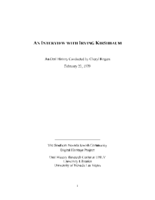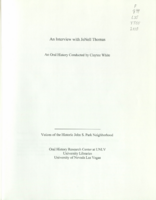Search the Special Collections and Archives Portal
Search Results

Simon Lamsal oral history interview: transcript
Date
Archival Collection
Description
Oral history interview with Simon Lamsal conducted by Jerwin Tiu, Cecilia Winchell, and Stefani Evans on December 16, 2022 for Reflections: the Las Vegas Asian American and Pacific Islander Oral History Project. In this interview, Lamsal describes growing up in Kathmandu, Nepal, and growing up with his grandparents. After graduating in Nepal, Lamsal applied to college in the United States and started in Arkansas studying computer science but later relocated to Las Vegas, Nevada and continuted at the University of Nevada, Las Vegas (UNLV). Lamsal describes joining CSUN, the National Millenial Community, and investing in his community. Currently, he is in graduate school and an information technology intern at MGM. Thoroughout the interview, Lamsal touches on a number of other topics regarding finding community, cultural foods, and family life.
Text

Sylvia Alvarado interview, April 12, 2019: transcript
Date
Archival Collection
Description
Interviewed by Rodrigo Vazquez, Monserrath Hernández, and Barbara Tabach. Sylvia Alvarado talks about growing up in North Las Vegas and her Catholic upbringing in a Mexican household. Her studies in Journalism & Media Studies led her to her career as a radio host on English and Spanish-speaking programs. She also talks about speaking "pocha" Spanish and the Latinx influence in radio programming.
Text

Transcript of interview with Juanita Kilburg by Vincente C. Camacho, March 7, 1981
Date
Archival Collection
Description
On March 7, 1981, Vicente C. Camacho interviewed accounting clerk, Juanita Kilburg (born September 25th, 1923 in Los Angeles, California) on the second floor of the UNLV Dickinson Library. Kilburg explains how her family first moved to Southern Nevada and her father’s ties to the railroad. She then goes on to explain the growth of the military and Nellis Air Force Base. The interview concludes with a discussion on her work with the American Legion service organization.
Text

Meli Calvo Pulido oral history interview: transcript
Date
Archival Collection
Description
Oral history interview with Meli Calvo Pulido conducted by Laurents Banuelos on November 13, 2018 for the Latinx Voices of Southern Nevada Oral History Project. In this interview, Pulido discusses her early life in Tijuana, Mexico and moving to Las Vegas, Nevada in the mid-1970s. She talks about the challenges she faced as an English as a Second Language (ESL) student, and assisting her parents who did not speak English fluently. Lastly, Pulido describes volunteering for the non-profit organization Project 150, the work the organization does for homeless youth in Las Vegas, and assisting underprivileged students.
Text

Charles Scott Emerson oral history interview: transcript
Date
Archival Collection
Description
Oral history interview with Charles Scott Emerson conducted by Claytee D. White on December 21, 2017 for the Remembering 1 October Oral History Project. In this interview, Charles Scott Emerson discusses his work with the American Red Cross and the disaster relief the organization provided during the aftermath of the October 2017 mass shooting in Las Vegas, Nevada. The interview begins with a discussion on Emerson's early life and career in Missouri and how he moved to Las Vegas in 2004. Emerson talks about the American Red Cross response plans and coordinated operations that are in place for when the community is faced with a disaster, going into specific detail on the community-wide response to the October 1, 2017 shooting. He gives a behind-the-scenes glimpse into how relief work is organized, using this interview as a chance to praise the hidden heroes of the October 2017 tragedy, including the people at the Family Assistance Center, the Attorney General's Office, the Driver's License Bureau, and the Coroner's Office, as well as mental health providers, child care workers, blood donors, and more. Throughout the interview, Emerson puts special emphasis on the importance of community in order to offer support in the aftermath of a tragedy as well as to prevent a man-made tragedy from occurring again.
Text

Transcript of interview with Jackie Abell by Robert Stuart, April 03, 1976
Date
Archival Collection
Description
Text

Transcript of interview with Thomas Rodriguez by Maribel Estrada Calderón, September 10, 2018
Date
Archival Collection
Description
Known for “raising hell and making a difference” in the Las Vegas Valley, Thomas Rodriguez has dedicated more than four decades of his life to the political, educational, and social advancement of the Latinx community. Tom was born in 1940 to Jennie Gomez and Joseph Rodriguez in a Topeka, Kansas neighborhood its residents called The Bottoms. Mexicans, Mexican Americans, American Indians, African Americans, among other peoples lived in this diverse and beloved community. In 1956, the Urban Renewal Program, a program funded by the Federal Government that sought to raze neighborhoods the city considered to be “slums,” forced The Bottoms’ residents to abandon their homes. Rodriguez recalled the effects that this event had on his family and on his educational career. Despite his family’s relocation, he graduated from a high school located in a nearby neighborhood in 1958. Years later, the activism and ideology of the Chicano Movement of the 1960s taught Rodriguez that to overcome the injus
Text

Transcript of interview with Irving Kirshbaum by Cheryl Rogers, February 23, 1979
Date
Archival Collection
Description
Interview with Irving Kirshbaum by Cheryl Rogers on February 23, 1979. In this interview, Kirshbaum discusses the Riviera Hotel where he began working in 1955. He also talks about the landscape of the Las Vegas Strip in the 1950s, and the state of gambling, comps, customer service, and dealer training. The interviewer asks about the treatment of minorities at the Riviera, and in Las Vegas generally, and the effect of corporate ownership on casinos.
Text

Transcript of interview with Gilbert D. Yarchever by Claytee White, 2006
Date
Archival Collection
Description
Gilbert Yarchever was one of nine siblings, born and bred in Pittsburgh, Pennsylvania. He describes the way his mother?s family was granted the last name of ?Kurfeersf" by Emperor Franz Joseph (of Austria-Hungary), explains the Seder (the Jewish observation of the exodus of Hebrews from Egypt), and tells what it was like to survive the Depression. Gilbert describes the jobs he held after high school and the government examination he took that led to his lifetime of adventure and travel. He moved to Washington, D.C., in 1940 and kept himself busy working for the government and taking classes at George Washington University, as well as working part time at Hecht Department Store and as a freelance court reporter. Following the attack on Pearl Harbor in 1941, Gilbert was sent to Africa on a merchant ship, helped smuggle Jewish survivors into Jerusalem, and was assigned the task of negotiating with Arab sheikhs for laborers to build a road. In the years after that, he worked in Europe, Panama, Alaska, Japan, and Hawaii and describes many of the jobs he was responsible for and many of the individuals he met. He also married and had children, kept up with university classes whenever he could, and collected art objects and paintings. Following his retirement in 1977, Gilbert and his family came to Las Vegas and bought a condo in Regency Towers. He did some consulting work for a couple of years, and then he and his wife began traveling around the states and going abroad. He was involved with UNLV?s EXCEL program, the music department, and the Las Vegas Art Museum. (He and his second wife Edythe presented the first major exhibition on Holocaust art at the museum.) These days Gilbert often donates pieces from his art collection to churches, synagogues, and charitable organizations.
Gilbert Yarchever was in the Navy during World War II, helped smuggle Jewish refugees into Jerusalem, worked as a civil servant in many countries, and moved to Las Vegas in 1977. He helped found the EXCEL program at University of Nevada, Las Vegas and was an art collector with his wife, Edythe Katz-Yarchever.
Text

Transcript of interview with JoNell Thomas by Claytee White, January 12, 2010
Date
Archival Collection
Description
JoNell Thomas grew up in a large Utah family, went to Utah State and law school at University of Utah. She moved to Nevada in 1992; first as with the Nevada Supreme Court and then as a staff attorney with a Las Vegas firm, and currently is an attorney with the Clark County Special Public Defender's office. She and her husband, Billy Logan and their twin daughters have lived in the John S. Park Neighborhood since 2001. Their residence was constructed in 1956 on a large corner lot with lots of trees and a fifty-year-old swimming pool. JoNell offers her observations on a variety of JSP events: Stratosphere's failed rollercoaster across the Strip idea; the proposed high-rise complexes; the Monorail lack of convenience to locals; effects of dropping home prices and downturn of economy; the homeless population and closing of Circle Park. She helped create the early online community called the Downtown Neighbors website which provided information regarding , part activist, part pra
Text
